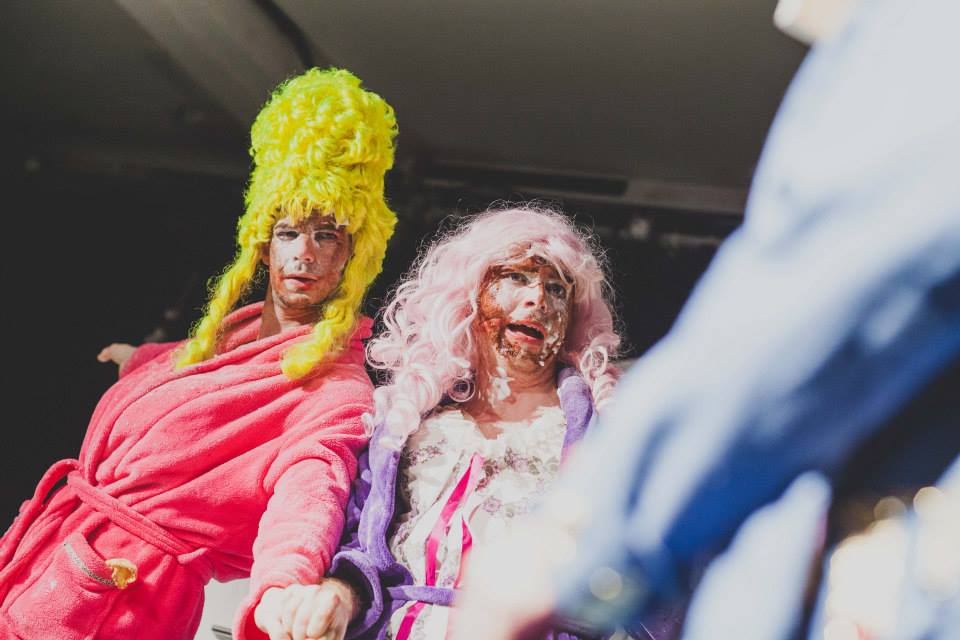In the past few months Middle Child have had discussion after discussion about streamlining and honing both the work we make and better articulating the audiences we are trying to reach. We’ll be talking much more about this in the coming months, but as we get closer to Christmas, a huge part of these conversations has been about how we continue to justify our annual alternative pantomime at FRUIT: how we make sense of a move from Weekend Rockstars to Cinderella (pictured above), from Mercury Fur to Aladdin. This blog post attempts to explain why I see pantomime as such an integral part of our programme.
To start it’s important to talk about what panto is and where it has come from.
The original form of pantomime is now almost entirely unrecognisable from the shows we are used to today. Where we now eagerly await the arrival of the Dame, audiences used to come to pantomime to see the Clown; while we now see the pantomime solely as Christmas entertainment, past audiences were treated to its delights all year round; the genre now often dismissed as children’s entertainment was previously seen as much more universal and important. These differences are just a few examples of the many transformations the genre has undertaken, yet despite changes in characters, plot lines and purpose, “it has somehow contrived to remain at heart the same thing” (Gerald Frow).
One thing that seems consistent in the history of pantomime is its role as money maker. Many theatres in these frugal times rely on the profits of panto to fuel their next season, just as the Theatre Royal, Drury Lane did on the genre’s inception. It’s also true that pantomimes continue to be the highest selling shows in both professional and amateur theatres. QDOS – the world’s biggest pantomime producer – made in excess of £25 million last year across 24 shows. However, there is more to the role of pantomime today than magic beans and sudden riches.
I think it is important to point out at this juncture that we do not make money out of our alternative pantomime. A combination of the large cast size and low ticket prices mean our show is more about reaching new audiences and offering an affordable alternative than improving our bank balance. In future we are looking to make the venture more sustainable, but for this year we rely heavily on the fantastic support of HEY Smile Foundation and a number of other sponsors – THANK YOU!
Popular theatre
The first recorded panto in this country was John Rich’s The Magician at Lincoln’s Inn Fields in 1721. The pantomime had obvious links with Commedia Dell’Arte and, more specifically, its Harlequin characters. Rich placed these well known and highly developed characters in an environment which was “topical (and) used satirical songs” (Millie Taylor). He also “added the transformation scenes that were staged at the fairs of Paris” (Samuel McKechnie, Popular Entertainments Through The Ages). In combining such spectacle and immediacy Rich created a new form of theatre which established the pattern that pantomime was to follow.
This new theatrical form did not take long to gain popularity amongst audiences, however actors and theatre managers were sceptical about the latest trend. After being forced to drop Shakespeare for pantomime in 1750, David Garrick spoke bitterly in a prologue: “Unwilling we must change the nobler scene, and, in our turn, present you Harlequin (…) For though we actors one and all agree boldly to struggle for our vanity, if want comes on, importance must retreat; our first great ruling passion is – to eat.”
The feeling was that pantomime was popular, but not respected. Although audiences came in their droves to see the shows, promoters and actors were not happy with its perceived lack of artistic merit. Certainly an element of this is retained today and exists at the heart of pantomime perception. However, then as now, it was audiences who continued to secure pantomime’s popularity.
Audience expectations
I think there are many key elements which make pantomime so popular, such as the power of the ritual, the resilient ability to remain relevant and a unique and special relationship with its audiences. For me the main draw is that each panto-goer has a specific idea of what pantomime is and what they expect. There is very little risk in buying a ticket to panto. It is perhaps ironic that a genre which changes form so frequently often has such specific expectations for its spectators. Both adults and children can regularly be heard entering the theatre with excitement for the ghost gag, the kitchen scene or the transformation scene.
Over the past few years after shows we have also had many conversations with audience members along the line of “I don’t usually enjoy panto, but I enjoyed this one”, creating an interesting paradox: if our show included all of the elements of a ‘proper pantomime’, then what changed this spectator’s mind? Perhaps it was the idea of the ‘unique event’; when “the performers refer to events and places in the town as well as wider political and cultural events in the country to establish a shared community with the audience in the experience of living in contemporary Britain” (Millie Taylor).
In our case, people living in Hull making the show for people living in Hull. Taking the example further, the statement that someone doesn’t “usually enjoy panto” knowingly alludes to the expectations of the genre and the acceptance – with which I agree – that lots of pantos are terrible, soulless affairs, trading purely off of a celebrity name. However, even a self-professed critic of pantomime, who presumably does not visit one each year, seems to have a view of what necessitates a ‘proper pantomime’.
Comfortable theatre
So what exactly is it that we expect? The anticipation of slosh scenes? Popular songs? Social comment? A well known story? Pre-defined audience rules of engagement? Stock characters – the dame, the principal boy, the villain? Gender reversal? The notion of the show working on two levels – one for the children and another, more risqué version for the adults? Each of these formulaic devices are usually expected of a panto and it could be argued that the neglect of one or more of these would bring into question whether or not that show was indeed a pantomime.
My inspiration, Millie Taylor, defines the narrative of pantomime as “a re-telling of a well-known fairy or folk tale along pre-determined and familiar lines”. I would argue that the reason audiences enjoy well known stories such as Cinderella, Aladdin and Dick Whittington is because they offer a recognisable core within which to host the chaos and madness. Knowing the story and its characters ensures that the audience are relieved of any real pressure to keep up with the narrative and can instead focus on their enjoyment and involvement of the excesses and frivolities of pantomime.
I would even go so far as to argue that this is perhaps one reason why pantomime audiences prosper over other types of theatre. With pantomime there is very little danger of the average spectator feeling lost, confused or worse, stupid, as they may with a production of Hamlet for example. There is a state of relaxation ensured when an audience know exactly what is expected of them: to cheer the good guys, boo the bad guys and scream when prompted. My former lecturer Rob Cheesmond described this state evoked by pantomime as “anti-intellectualism” and describes how, for once, the theatre becomes “a place in which the spectator is allowed to feel truly ‘comfortable’”.
Co-conspirators
It is this feeling which excites me so much about pantomime and confirms its importance in what we are attempting to achieve as a company. While the aim isn’t solely to create “anti-intellectual” theatre – we definitely want to challenge audiences in both form and content – we dream of a world where all theatre is treated with the anticipation and sense of ‘belonging’ that pantomime affords, yet all too often I feel that casual attendees of the theatre are left intimidated by buying a ticket. What pantomime does brilliantly is reduce the risk of coming to the theatre. If we can engender this feeling with the rest of our work then I believe we will be winning an important and difficult battle with the perception of theatre amongst many.
In pantomime the individual pensive spectator sometimes associated with the theatre no longer exists, instead the audience enter into a community with each other and with the performers, transgressing the ‘rules of theatre’ as they join in on the action, sometimes even driving the plot forward. Taylor describes how the audience “work together as co-conspirators in the development or completion of the story” while also being “able to predict to a large extent the content of that experience, and in this case, that participation will be required, and what types of participation will be required”.
Taylor is commenting on Herbert Blau’s notion that “an audience without a history is not an audience” – a statement which ties in nicely with the timeless inspiration of John McGrath’s A Good Night Out. From the second the audience enters the theatre, let alone the performance space, they are aware of what will be required of them and how they will be expected to behave. The forming of a community amongst the spectators is immediate and is often helped along by the stage performers. Clearly, as the audience wishes Jack good luck, screams at a ghost or laugh together at the havoc created in a slosh scene, they are experiencing pure communitas born out of ritualistic participation. It is quite feasible that, upon leaving the theatre, spectators may find it socially awkward greeting a fellow audience member whom they were earlier complicit with in hissing and booing – such is the power of the pantomime community.
Ritual
Away from the event itself it also appears that pantomime has become a part of the ritual of Christmas time. Although pantomime does take place at other times of the year, the festive season is when it is at its most successful. It is not unheard of, perhaps even common, that some pantogoers visit the theatre just once a year – for pantomime itself. It is important to consider then, that pantomime has relevance above and beyond being a show in the theatre.
Perhaps pantomime’s success is more rooted in the fact that it has become something that is expected at Christmas time, much in the same way as presents and mince pies are. It could be reasonable to argue that pantomime audiences are just as likely to critique the merits and pitfalls of the show as they are to comment on the Queen’s speech or the prizes in Christmas crackers. Is it enough for pantomime audiences that they simply see the pantomime, participate in its communitas and then return home satisfied that they have completed yet another event on the Christmas calendar?
I would argue that for many families this is in fact the case; however I personally do not see this as a negative view. A form of theatre being this habitual and ritualistic can only be a good thing for the survival of the industry, and proves the power and importance theatre has the potential to hold. The question is how do we find this level of attachment with our audiences all year round?
Unique
For me, the ritualistic nature of the pantomime, its ability to create communitas and its habit of re-inventing itself just when it is ‘curtains for the panto’ (Gerald Frow) is what sets the genre aside from other theatrical forms. No other genre has such a checkered and changeable past, yet remains at the forefront of entertainment today. No other genre allows the audience – be they young children, grandparents or teenagers – to feel ‘comfortable’ and ‘at home’, as they do at the pantomime. No other theatrical genre has the license to immediate satire that pantomime has, its modern jests matching the wit of those seen on television panel shows or sitcoms.
Rather than ‘pooh-poohing’ the pantomime, it is my belief that Middle Child can in fact take note of and learn from the continued success of a form which so easily attracts and excites audiences. In fact, pantomime does not sit outside of our wider programme as it may initially appear. The very essence of pantomime – chaotic, welcoming, popular and at times, electric – is what we strive for in all of our work. If pantomime can continue to re-invent and re-establish itself in a time in which it is arguably outdated and unwelcome, then surely all theatre in Britain can do so too and we can work towards re-establishing a ritualistic love of the theatre.
Our 2017 pantomime is Cinderella, by Tom Wells. See it at Fruit in Hull from 16-30 December.








